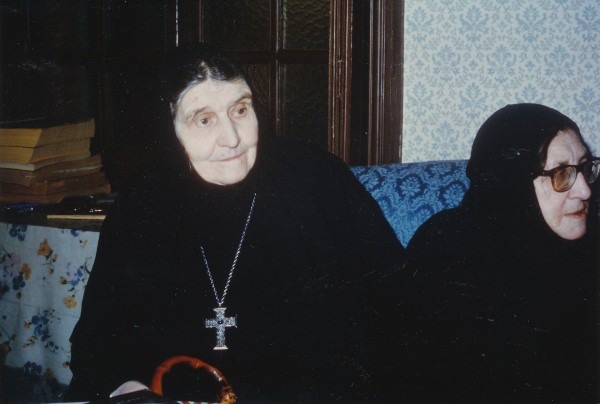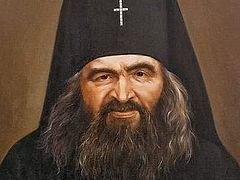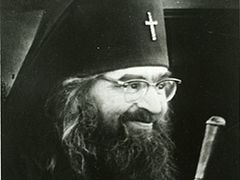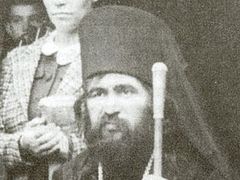 Archpriest Victor and Maria Potapov.
Archpriest Victor and Maria Potapov.
Two months ago by Divine providence I met a wonderful person—Maria Potapova. She is an intelligent, open (typical for Russian people), energetic and hospitable. Mitred Archpriest Victor Potapov’s faithful life companion, Maria is a priest’s daughter, a priest’s wife and a bishop’s niece!
She descends from an ancient Russian family. Her mother, Anna Mikhailovna, nee Rodzianko, was a granddaughter of Michael (Mikhail) Rodzianko, chairman of the State Duma of the third (1907-1912) and fourth (1912-1917) convocations. Her father was a prominent archpriest—Fr. Sergy Chertkov (1908-1999). The Chertkov family was famous in imperial Russia for its benevolence: they opened the first free public library in Moscow, built a military school in Voronezh province along with a school for peasant children, a sugar mill and constructed the railway between Rostov-on-Don and Voronezh. Maria’s great-grandfather, Fyodor Chertkov, built a church dedicated to Greatmartyr Parasceva at his family estate near Voronezh, where he was buried.
After the Revolution the Chertkovs shared the fate of many other Russian exiles. During the Second World War Maria’s father was sent to a concentration camp. By a miracle he managed to escape death and promised to dedicate his life to the service of God and people. In 1947 he was ordained a deacon on the feast of the “Reining” icon of the Mother of God, and for ten years he accompanied Archbishop John of Shanghai in his journeys.
Fr. Sergiy devoted his energies to the service of Russian refugees, saving them from persecutions after the Second World War. Using his personal connections in the Foreign Ministry of France, he helped the Lesna Convent move from Communist Yugoslavia to France. His daughters Alexandra, Marina and twins Anna and Maria lived in this convent under the patronage of St. John of Shanghai, while his two sons were acolytes.
Nearly all of Archpriest Sergiy’s six children devoted their lives to Church. The elder daughter Alexandra worked for the Paris-based radio called Voice of Orthodoxy, which broadcast spiritual programs for Russia. Marina became a nun in Jerusalem at the Mount of Olives Convent, while Anna became an icon-painter and the wife of Archpriest Vladimir Danilevich.
In the 1970s Fr. Sergiy was appointed rector of the St. Nicholas Church in Tehran where there had been no priest for several years. When he learned that many Orthodox Christians had been buried there with no funeral service performed over them, he started walking round the graves and performing funeral services over the departed. He also secured the building of an old people’s home in Tehran and a life pension for the Russian elderly who had been abandoned in this foreign land.
Fr. Sergiy had a great love for Russia and prayed for it to the end of his days. Like her father, Fr. Sergiy, Maria Potapova has devoted much energy and time to the care of the suffering, aiding all those in need who the Lord has been sending her. Maria Potapova and her husband worked for many years in the Christian Committee in Defense of Rights of Persecuted Orthodox Christians in USSR. The Committee members organized meetings, gave coverage of cases of persecution against believers, raised and sent money, and wrote protests to the Soviet embassy.
—Maria, looking at your family, one can study the history of Russia!
—I am a tiny part of this large family. (Smiles). My father was Fr. Sergiy Chertkov-Trubetskoy. His mother—my grandmother—was Princess Alexandra Nikolaevna Trubetskaya. My great-grandfather was Mikhail Vladimirovich Rodzianko, chairman of the State Duma. My mother was a sister of Bishop Basil (Rodzianko). My uncle, Vladimir Mikhailovich Tolstoy, was a grandson of Leo Nikolaevich Tolstoy.
—And your father for ten years served as protodeacon to St. John of Shanghai!
—Yes, father spent many years with the archbishop. And I was born and spent the first twelve years of my life near St. John. My dad was his only protodeacon. Then the archbishop was exarch of Western Europe, and my dad used to say that they “travelled all over Europe” together. My father served for 50 years, 22 of them as a deacon, and he died an archpriest.
When he became a priest, he used to come to the church in the middle of the night to perform a Proskomidia.1 He collected all the commemoration books from shelves, prayed for repose of all whom he met in the course of his life—thousands of names. He spent hours taking out particles from prosphoras for every single person. Then I used to think that it was a norm, that every priest always did it…
When he was an old man, I asked him one day: “Father, why does it take you so long to perform the Proskomidia?” He smiled, “Don’t you remember who I spent nights with in the altar?” These were the fruits of St. John of Shanghai…
—Can you share memories of your childhood, spent under the patronage of St. John, with us?
—I grew up near St. John—a holy man—and I felt his holiness instinctively. Children feel these things better than adults.
The archbishop lived in prayer all the time. He was an ascetic, but he did not separate himself from the world. He cared for people in a wonderful way! The suffering, unhappy families always gathered around him, and he gave them his love.
His stomach somewhat jutted out, though he ate very little. I always wondered why it was so. And only afterwards was I told that he used to wear chains. Everybody said that he walked barefoot but I only saw him with sandals on his bare feet. I also knew that he never slept in a bed. And I looked at his bed and thought, “Oh, how amazing—you will never need to make this bed!”
I remember his cell in Lesna Convent very well; my sisters and I literally grew up there.
Wonderful nuns lived there: Abbess Theodora (born Princess Nina Nikolaevna Lvova); Assistant Abbess Mother Magdalina (Grabbe), a fantastic person and a pure soul. There were many such nuns there… Have you heard of that convent?
—Yes, I have. Let me add a few words for our readers about the sisters you have mentioned.
The future Abbess Theodora was born in Khabarovsk in 1893. At the age of 20 she, then a very young woman, voluntarily went to the front of the First World War as a hospital nurse. Tall, strong, beautiful, and tireless, she wished to serve her fatherland. During the civil war she married Prince Constantine Lvov and took part in the White Army’s campaign together with him. Eight months after their wedding her husband died of camp fever and Nina Nikolaevna left Russia together with the White Army.
With the blessing of Metropolitan Anthony (Khrapovitsky), the first head of ROCOR, the princess joined Lesna Convent, which then was in Yugoslavia. She was in charge of an orphanage, which prospered under her, and no children died during that period. Over those twenty years there were more than 500 children under the care of the loving Lesna sisters.
Nun Magdalina, born Countess Nina Pavlovna Grabbe, succeeded Mother Theodora as abbess after the latter’s death in 1976. She was renowned as an expert on patristic literature and asceticism. Through her prayers the Valaam anthology On the Jesus Prayer was published in Russian, English and French.
—Maria, you must always remember the days spent in that convent!
—Yes, it was by the grace of God that I lived there. I remember the archbishop’s armchair in the corner of his cell—he used to doze in it. Once I was in his cell when the saint was ill. Mother Theodora came and began to insist that he lay in bed at least for the period of his illness, but the archbishop refused.
We girls assisted during services at Lesna Convent—girls may assist at convent services without entering the altar. My sisters Anna and Marina assisted too. We did not come into the altar, but did the rest. We used to stand through the Liturgy: one with the staff, one with the candle, by the open Royal Doors during the hierarchal service. That was my childhood… And we took part in the Great and Little Entrances… I remember how I stood at the Liturgy with a basin and a jug for the washing of the bishop’s hands and how a towel was put around my shoulder. The archbishop rinsed his hands and wiped them… We girls were very fortunate. We grew up with such childhood memories…
The archbishop also cared for the cadets of the military school in Versailles near Paris and served there.
I usually spent summers in the Vityazy (“Knights”, or “Heroes”, or “Noble Warriors” in Russian) camp. As I grew older, I went to the Russian Students’ Christian Movement. We were great friends! The Vityazy camp gave me the feeling of the Russian spirit, the Christian Movement gave more of a Churchly feeling.
The archbishop came to the Vityazy in the Alps. He lived in a tent in the forest. I used to run away from the camp and come to the holy man’s tent. He would sit at work, usually typing. Wherever he went, he always took a typewriter with him. He kept himself busy. He cared much for his diocese and his flock—up to the smallest details of their lives! We even keep copies of all his handwritten decrees—he ministered to his flock with such a profound love, that it was simply marvelous and unbelievable!
And he never told me to go away, and I had a great desire to be near him for some reason. He would treat me with nuts, almonds, and I would sit on the grass near the tent, play with twigs, watch ants and dragonflies…
—It was believed that the archbishop was sometimes a fool-for-Christ…
—Some people said that Archbishop John sometimes behaved like a “fool-for-Christ”. But my father did not agree with that. St. John was different, not like most of people around him. His speech was rather inarticulate. He was a particular man.
When I was with him, I was aware that he was not like others. When I accompanied him as a child I amazed at his ability to communicate with children, in their “children’s language”, so all the little ones felt absolutely fine with him. It was an unbelievable contact!
—Do you remember any cases of the archbishop’s clairvoyance with regard to your family?
—I have a brother named Nikolai. His close friend was a 14-year-old French boy, Renee. The latter was a Catholic and he was dying from cancer. The archbishop prayed for him. And thus we got the news that Rene was dead. My brother worried so much that he refused to eat and drink. The parents did not know how to help him, pining away from grief. We had no telephone at that time. Suddenly we heard a doorbell. I opened the door and saw the archbishop, who said, “I have come to Kolya [the diminutive form of the name Nikolai].” I took his blessing and the saint proceeded straight to my brother—I did not even need to show him the way! And he knew of Kolya’s anxiety himself—nobody had told him about this. He locked himself in my brother’s room and stayed with him a very long time. I feel certain that Nikolai remembered the archbishop’s words of consolation forever.
St. John always travelled on foot or by public transport. He would visit lonely, suffering, dying people known to nobody, at any time of day or night and anywhere. How could he learn about my brother’s anguish? About that French boy’s death? We had no telephone and nobody could have informed him. But he did know.
—That is wonderful!
—We had many miracles associated with the archbishop. My uncle, Vladimir Mikhailovich Tolstoy, related how Archbishop John once came to the Holy Protection parish at Nyack near New York. The rector of that church was an excellent pastor—Archpriest Seraphim Slobodskoy (1912-1971), the author of the remarkable work, The Law of God, which was published and republished in great number. The reposed Patriarch Alexis II remarked that it was the desktop book of all Orthodox Christians, and the most published spiritual book after the Bible.
Fr. Seraphim was a true pastor; he devoted all his life to God and people. He was a real unmercenary, knew all his parishioners and took care of everybody. If he learned that one or another person was in trouble or sorrow, he at once rushed to them and did his best to support, console and strengthen them. He never remained aloof. That was a brilliant parish because it had a brilliant rector. Fr. Seraphim had a deep love for the archbishop, and St. John loved him too.
So Archbishop John celebrated a Liturgy at this parish and then he had to go to the airport—his time was limited. But as he went out of the church he said that he would not go anywhere until a certain woman would be found for him. The town of Nyack is not so big, but the parish was quite big. The parish was like one large family and Fr. Seraphim knew everyone in it—but nobody knew that woman. The parishioners decided that the archbishop was mistaken. Everyone began to worry as my uncle was due to take the archbishop to the airport. But the saint balked at going there—he was stubborn, in the good sense of this word—and said he would not leave until this person was found for him.
The town went out of its way and with great difficulty the people managed to find this lonely and unhappy woman, and my uncle Vladimir Mikhailovich drove Archbishop John to her. The saint got out of the car and went upstairs to her small flat—she was just about to take her own life. He stayed with her, talked with her and consoled for long time and then handed her over to Fr. Seraphim who, of course, took care of her from that time.
My uncle accompanied St. John to the airport where, as it turned out, they were waiting for him—he was not late.
Can you imagine this? Such a great man lived in our times, in the twentieth century!
My elder sister much suffered from ill health in her childhood. Once when she was in the hospital she suddenly heard: tap, tap! What sound is this? And she saw Archbishop John entering her ward and coming up to her, bending down to her, smiling and blessing. He put a prosphora on her belly and disappeared! He was like an angel who came to comfort a child. He would often appear at the bed of a sick person at night, during a blizzard, in foul weather or storm.
—Which episode of your life with Archbishop John has stuck in your memory most of all?
—I remember how I alone saw the archbishop off on the train. I was still standing on the platform while he was already in the train. And he blessed me with both hands—the hierarchal blessing.
I would often recall this scene of my life when I grew up. I recalled how he blessed me without stopping—even when the doors closed and the train started off… And he kept blessing me until the train vanished from view. And I, a small girl, was standing alone at the railway station…
Now I understand that he blessed me for all my life, of which he then knew everything beforehand. He was blessing me to give me strength. Then I could not imagine that I was to move and live in America as a priest’s wife. I believe that everything was revealed to him about me: that I would marry a priest and that my husband would serve in the only parish that St. John had founded in the USA… And I know he is praying for us, though we are so unworthy…
This is his parish! Can you see these icons? They were at Archbishop John’s camp church on Tubabao Island, the Philippines, at the camp of the International Refugee Organization, where in 1949 some 5000 Russians from China were accommodated.
—Do you feel the archbishop’s support in your ministry?
—Beyond a doubt! We do feel his presence in this church. Many people come to ask for help—it is he who brings them here. And the archbishop helps them himself. It is he who should be thanked for this help. And through his intercession we are doing what a parish should always do: helping people despite anything. And as long as the parish lives that way, all will go well in it. And all the parishioners are involved in this—we do not need to persuade anybody or explain anything. This is the way of life.
I remember the time when our charity work was not well-established. One servant of God provided us a house where we accommodated the needy. I recall one moment: I did not know where to get the money to give food to those people. I often had to buy food through my credit card. I did not want to bother Fr. Victor with such problems, that problem was mine. So I did not say anything to anybody about it.
—And were there many people in need?
—Yes, and the Lord is sending us such people all the time. One homeless family is just currently living in our house.
And then I felt very bad as I could not solve my financial problem. I came to the church on Sunday morning. St. John was not yet canonized then, but Fr. Victor was aware that his canonization was approaching, so he took the liberty of depicting his image on a church pillar. It was during Great Lent. Fr. Victor was then holding Lenten catechetical lessons after the Liturgy and meal, and I was staying behind in the church.
I bought the largest candle in the church shop, lit it near St. John’s image and said: “Vladyko [Master] archbishop, give me money.”
It was all what I said. That was such a short prayer.
Suddenly someone touched my shoulder. I turned round and the man behind me held out a check for a very large amount of money, saying, “Take it, this is for your poor folk!”
And I was totally staggered, since nobody knew anything. I had only asked St. John, “Give me money.” This man noticed my amazement and I told him in a few words why I was so astounded. And I remember him telling me this: “Masha [a diminutive form of the name “Maria” in Russian], please do not pray to Archbishop John too often, otherwise all of us will be bankrupt!”
And St. John frequently helped me in this way…
One disabled boy suffered very much: he had issues with bones and teeth. He used to crawl on the floor, being unable to walk. We sheltered his family. And we needed a large amount of money for his treatment. Fr. Victor asked me: “You want to help these people, but how are you going to pay for this?” I replied: “Do not worry about this problem!” And when he left, I addressed Archbishop John: “Archbishop, help me, please!”
We went to an excellent dentist with this boy and his mother. The doctor did not know the details of life of this boy from Russia. He was a good and expensive doctor. I looked at my check book and thought to myself, “How am I going to pay for the treatment?” At once his mother came out of the dentist’s office, red-faced and abashed, saying, “We do not need to pay for anything.”
As it turned out, the boy during the treatment had the same thoughts: “How is Maria going to pay?” And the doctor interrupted the procedure and said to the boy, as if hearing his thoughts: “Do you know? I am treating you free of charge!” His mother asked with astonishment, “But why?” And the dentist answered with a smile, “Because I like Seryozha [diminutive of Sergei, the boy’s name].”
And I realized that the archbishop helped me again!
Such are our little stories—we have had plenty of them…
That same handicapped boy began to walk after the canonization of St. John of Shanghai. The boy was wrapped in the archbishop’s mantle and he soon warmed up, his pains disappeared… He then straightened up and made his first step…
—You talk with St. John as if he were alive! But indeed he does hear everything…
—Here, in our church, everything is done through the prayers of St. John of Shanghai! I know it very well: we should be afraid of the day when the Lord stops sending us people who need our aid… And you should help others not only when it is convenient and easy for you, when you have money, but also when you have no money and when you deprive yourself of your last possessions. This is a real help! And then the Lord will never abandon you!
If you do not help others when you have no resources, neither will you help when you get rich. We must be able to help when we cannot afford it.
—Maria, do you feel the archbishop’s support during temptations?
—Once I had a great temptation. We had a lack of money and could not make ends meet; however, I did not deny help to the needy. And my close relatives reproached me, saying that that I squandered my money right and left in order to help others but deprived my own children of necessities. I was embarrassed and anxious, thinking, “I must be crazy indeed.” Being in this terrible temptation, I even avoided confession and Communion.
And at night Archbishop John appeared to me. He was very stern and in his hierarchal mantle. He ordered me to resume going to confession and taking Communion. But that sternness was inspired by concern and love. He made me kneel down and began to confess me. And next he softened and got very kind. He knelt down beside me and said, “Lest your heart should be confused, continue what you are doing now! Do not worry!”
And he put money into my hands and they suddenly multiplied!
When I woke up, a good sum of money suddenly appeared from nowhere and I managed to make the ends meet!
—Does Fr. Victor resort to St. John (Maximovich) in his prayers, like you?
—Fr. Victor did not have the privilege to know Archbishop John personally, but when he heard of the saint’s repose he got very frustrated. He venerated him deeply. St. John appeared to him in dreams in difficult life circumstances, consoled him and predicted the future public ministry on The Voice of America broadcasting station where he was to work for thirty years. The archbishop always helped Fr. Victor in this work, and an icon of St. John of Shanghai always hung near him in the corner at his office.
—Thank you, Maria, for this wonderful talk!
—May the Lord help all the readers of our website and its spiritual leader—Bishop Tikhon (Shevkunov)!













Thank you, Archbishop and Father John Maximovich.